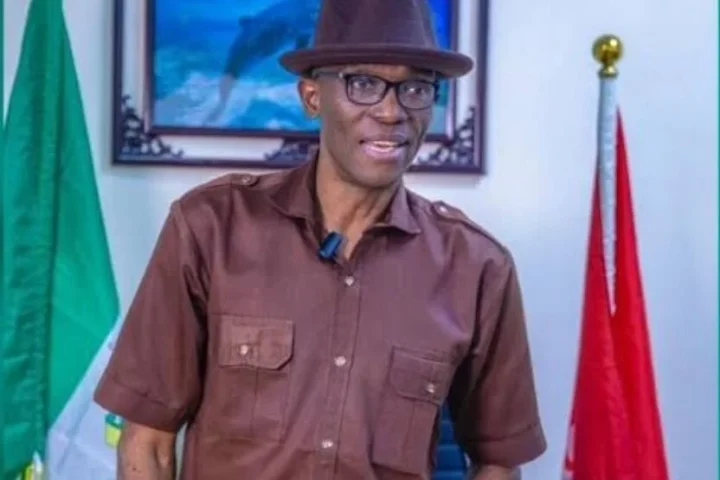Philanthropic organizations are increasingly playing important roles in the development of Nigeria as the citizens endure a worsening cost of living crisis. These organizations, registered as foundations, are reaching into their deep pockets to fund diverse causes and offer succour to citizens across the country. In challenging economic situations, philanthropy provides opportunities in many areas of need and supports projects and endeavours that might not have received adequate government funding. The art of giving back to society has the power to influence lasting social change; touching many lives, potentially for generations. Philanthropy is therefore one of the cornerstones of a stable society.
In the last year, we have highlighted the activities of some of these philanthropic organizations and presented them as agents of social and economic empowerment. In this piece, we shall focus on the Aig-Imoukhuede Foundation and its roles in creating a culture of excellence, effectiveness and integrity in public sector organizations. Since 2021, the foundation has been organizing an intensive leadership capacity-building programme for senior public service staff in Nigeria and other African countries. Known as AIG Public Leaders Programme (AIG PLP), it offers these emerging public sector leaders a unique opportunity to develop their capacity and acquire the skills and knowledge necessary to drive change in the public service. It is run in conjunction with the University of Oxford’s Blavatnik School of Government which provides the teaching faculty. Already 161 Africans, mostly Nigerians, have benefitted from it, while another 68 are currently in training.
Join our WhatsApp ChannelFor each participant, the foundation spends £11,000 for the executive programme. Over £1.87 million (well over two billion Naira at today’s exchange rate) has already been spent on the three cohorts. Executive Vice Chairman, Mrs Ofovwe Aig-Imoukhuede says the criticality of the public sector is the reason for the intervention. Her words: ‘’The public service plays a crucial role in society by providing goods and services for citizens. Research shows a clear correlation between a country’s social and economic development and the efficiency of its public service. The public sector is crucial in implementing plans, and policies and ultimately creating an enabling environment for businesses and residents of a state to thrive. In Nigeria, the quality of public service delivery has consistently been declining for decades across the board. Public institutions are characterised by unqualified and poorly motivated staff, institutionalised corruption, resistance to change, poor cooperation, red tape, bureaucracy etc. At the heart of our work to actualise our goals is our commitment to building a critical mass of public sector leaders who are equipped with the skills, knowledge, and tools required to lead and sustain reforms’’.
The first week of the programme is an intensive and immersive residential course featuring lectures, workshops, case studies and simulations led by Blavatnik School faculty. It’s a very demanding programme, engaging participants through classroom discussions, practical exercises, simulations and group work. Prof. Chris Stone, a faculty member, says the participants have been outstanding. ‘’They are smart, experienced and deeply committed to the civil service and public service. I think the energy so evident in the programme comes from meeting each other and reinforcing one another’s personal integrity and desire to participate in the improvement of their institutions’’, he told me. In addition to partnering with the Aig-Imoukhuede Foundation, Blavatnik School of Government is also working in support of broad civil service reform in Brazil (in partnership with the Lemann Foundation) and in the UK (in partnership with the Cabinet Office). But the partnership in Nigeria with the Aig Imoukhuede Foundation and the Office of the Head of the Civil Service of the Federation was the first of these and remains hugely inspiring to others, according to Prof Stone, a professor of Practice of Public Integrity at Oxford. He is confident that the impact of the AIG PLP Programme is already being felt through more than 100 individual projects initiated by the participants over the last three years, from automated property registration to improved public broadcasting to improved utilisation of hospitals. The bigger potential in the programme is for a wholesale transformation of the civil and public services, with greater delegation of authority, stronger public/private partnerships, greater use of digital tools, and strengthened public integrity.
Indeed, the participants themselves have attested to the transformative power of the training they’ve received. Ms Zukiswa Mgolomba, 37, is the deputy chairperson of the National Public Service Commission of South Africa. At 37, she has spent 14 years working in various roles and many departments in her country. She attended the second cohort of the programme and graduated in early 2023. For her, the one-year programme turned out to be one of the most transformative learning experiences and she told me that she was able to take away three major lessons from the programme. First, as a leader in Africa, the programme taught her that she can push the boundaries of what is possible in the continent for the benefit of women and children. Second, she learned about the power of technological advancement in the automation of her work to deliver quality service and third, she learned about the criticality of the roles of ethics and integrity in and out of the workplace and why it is absolutely important for Africans to maintain these values with all the complexities in the public service. She commended the programme as ‘’an excellent initiative that fosters African partnership between nation states’’.
AIG PLP is designed on the premise that executives ascending the ranks of government departments, agencies and ministries must maintain exemplary performance in their current role while developing the new skills and perspectives needed to take on a top leadership role. For Mr Akinyemi Abayomi, the Head of ICT in the Lagos Office of NAFDAC, it was the first advanced management programme he attended in his over 15 years in the public service, and the experience was quite transformational. ‘’For one, the faculty was very good; they were open and sincere, and the lectures align totally with my interest in integrity, strengthening processes and work ethics’’, he said. The three major lessons he learned about the Theory of Change; organizational strengthening and integrity have changed him forever. Said he, ‘’After the programme, I was able to bring ISO 27001 Information Security to NAFDAC which means that for any project implemented at NAFDAC, we have to inject integrity into it and one’s integrity is paramount in anything one does’’.
Caroline Kendagor, Principal Magistrate in Nairobi, Kenya, is currently participating in the program, and she’s acquiring new skills rapidly. The programme provided her the opportunity to visit Nigeria for the first time, and, according to her, she liked the weather, food and the warmth of the people. But more than that, she’s learned some decision-making skills; how to create a culture of teamwork and ‘’I now see the concept of accountability and responsibility from a whole new angle’’. She said that it was interesting to learn about the challenges that cut across the public service in the continent and ‘’the innovative solutions that the various sectors are employing’’. ‘’The program has so far broadened my thinking about the importance of culture change strategy as the program I oversee is a new concept’’, she told me last Saturday morning.
For Navy Commander Ibrahim Madu whose natural passion is leadership development, AIG PLP is a life-changing experience and he’s ‘’benefitting maximally from it’’, as he told me. His schedules are understandably tight, but the young officer tries to stay calm under intense work pressures. A 2007 graduate of the Nigerian Defence Academy (NDA) – the prestigious Kaduna-based military university – Madu joined the Navy immediately after graduation; and today, he is a Navy Pilot/Flying Instructor. ‘’I have attended many courses, but the AIG PLP is mind-blowing and very enlightening’’, he enthuses, adding that Nigeria’s problems are tied to the leadership challenge, and so there is a strong need to enhance our capacity and knowledge of our leadership in every sphere. He is also a member of Cohort Three and so far, he’s learned about the importance and technicalities of decision-making and the criticality of integrity in life and work. His words: ‘’As Africans, we are easily influenced by our cultures, religions and the tensions between our integrity and the organizational integrity. In addition, there is also diversity in the workplace. So, the challenge for a leader is to strike a good balance among all the contending forces’’. Navy Commander Madu is grateful to the programme’s faculty which, according to him, is from ‘’the best university in the world’’ for bringing fresh perspectives to teaching. ‘’Despite my busy schedule, I am determined to complete the programme’’ he concluded.
Other alumni are also effusive in their testimonies. Engr. Uchechi Ijeoma Edosomwan, a deputy general manager at Nigeria Airspace Management Agency (NAMA), says the AIG PLP is one of the advanced management programmes she’s attended. Even with a Masters degree in electronics and telecommunications and a leadership position in the federal public service, she did not feel fulfilled without acquiring leadership skills and training. So, when she saw the advert early in 2021 for the maiden edition of the programme, she quickly applied. ‘’We went through a rigorous and highly competitive selection process’’, she said. The programme started on September 6, 2021, and has had a lifelong impact on her career and life. Her communication skills and ability to lead through others have improved considerably. ‘’I have become more creative with more innovative ideas to improve my department’s service delivery and there’s a clear succession plan in her department’’, she said.
For her capstone project in the programme, she developed and standardized the on-the-job training manual for Air Traffic Safety Electronics Personnel (ATSEP) in NAMA. The OJT manual, a 125-page document ensures the right knowledge, skills and competency-based tasks are taught. It was so earned impactful that it earned her a commendation letter from her management. She applies two key learning concepts: – strengthening organizational effectiveness and harnessing digital technology.
Reflecting on the activities of her foundation, Mrs Aig-Imoukhuede is convinced that the success of the intervention is already visible through the impact created by programme participants in their respective organizations during and after the programme. ‘’We consider our programme successful when AIG PLP alumni continue to foster cultures of excellence, effectiveness and integrity within the public sector. Ultimately, we would consider the programme successful when a significant positive change in the delivery of public goods and services to Nigerians and Africans can be traced to the critical mass of public sector leaders who have gone through our capacity-building programmes. We have a long-term ambition to train 3,000 public servants’’, she said.
In addition to the AIG Public Leaders Programme, the foundation also offers scholarships and fellowships to Nigerians and has recently instituted an endowment fund to reward deserving federal civil servants every year for their diligence, productivity and good conduct. A cash award of N500,000 is given to each of the selected civil servants during Civil Service Week every year, and this year, President Bola Tinubu was impressed enough to commend the foundation publicly.



















Follow Us